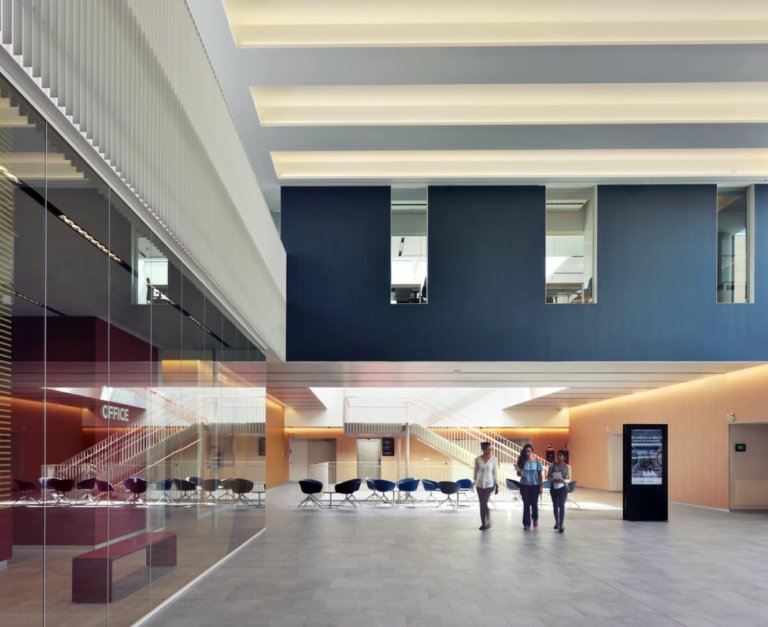
Milan may be internationally recognised as one of the world’s fashion capitals, but did you know that the city is also home to a leading medical school?
Italy may be under the radar when it comes to medical studies, but for students who would like to shift their gaze past traditional locations such as the US, UK, Australia and Canada but still enjoy an outstanding student experience, Humanitas University will prove to be a strong contender for aspiring medical professionals.
Humanitas is an international hub for the education of physicians, nurses and researchers who are trained to cope with future scientific, technological and social evolution. The university offers prospective students an unparalleled learning experience as the largest independent international Medical School in Italy, built within the Humanitas Research Hospital, a centre renowned across Europe for its excellent standard of healthcare and advanced research.
![]() A comprehensive medical school
A comprehensive medical school
International students can enrol in Humanitas’ six-year medical undergraduate programme, which is taught entirely in English by experienced professors and medical doctors from around the world, striving to prepare students for any career, be it clinical practice or research in Italy or abroad.
The Humanitas Medicine and Surgery degree programme is characterised by a multidisciplinary and integrated approach to teaching; most individual courses are grouped into modules, with a total of 360 credits and 29 examinations, distributed into 12 semesters.
From the first year, theoretical interdisciplinary modules are integrated with hands-on experience and simulation activities. Clerkships commence in the third year, when students can also access The Virgilio Program, intended for a selected number of medical students, who for three years, will integrate their curriculum with interdisciplinary seminars and internship activities in research laboratories. Students selected for the programme will have the support of a team of mentors and tutors in all their activities, including the preparation of their thesis and laboratory activities.
What makes the programme unique is its teaching methods. Particular relevance is given to interactive teaching, which mostly consists of group activities and teamwork coordinated by a tutor. Examples of such methods are Problem Based Learning, Case Method, Problem Solving, Concept Maps and Portfolios. Students will also learn from an international faculty including Nobel Prize winners, 70 professors and over 150 clinical tutors who closely follow students during their hospital training.
Special attention is also paid to vocational training to ensure medical students are equipped with specific vocational skills, allowing them to fully integrate theory and practice, and develop critical and autonomous reasoning skills. Students perform practical clinical activities under the supervision of a tutor, but with a considerable degree of autonomy, to simulate the activity performed at a professional level to enhance their career-readiness. Vocational training activities may include lab work for the acquisition of practical and relational skills, briefing and debriefing, formative feedback and portfolio.
Learning is not merely about being in a classroom or lab; students are encouraged to attend internal seminars and conferences, participate in research activities and experiences abroad through the Erasmus programme or other international mobility options.

Source: Humanitas University
Live and work abroad with a Humanitas medical degree
Humanitas is among the few foreign medical schools that’s recognised in the US, while the degree also allows students to work as medical doctors in the EU and abroad.
The university offers the US Medical Licensing Examination (USMLE), which, from their first year, prepares students for specific courses that will help them with the test, enabling them to enter a speciality school in the US. Humanitas was also approved by the California Medical Board, which would allow graduates to live and work in the US.
As a Hunimed student, you can expect to study in a diverse student community who come from 31 countries worldwide. This is echoed by student Naz, who hails from Turkey. “It’s very good being here, it’s a very international environment. It’s also really interesting to learn with people from different cultures and backgrounds,” she said.
She added that Humanitas provides an intimate learning environment where students have the opportunity to approach their lecturers and professors with ease. Naz particularly enjoys going through case studies with patient histories and their symptoms, following which, they have to decide what illness they have.
Louis, from France, said: “I really love the close interaction between the university’s medical research and hospital life.” He underwent a cardiology and nephrology clinical rotation, experienced in depth analysis of all his cases with his tutors and enjoyed contact with doctors to facilitate his learning.
Meanwhile, 2017 graduate Daniel Yiu, from Scotland, shared that he was drawn to Humanitas when he found out they have an English medical programme, enabling him to combine his dream of becoming a doctor and studying abroad. He also waxed lyrical about the international learning environment, which he described as “a big bonus” to being a student at the university. Yiu was also fortunate to obtain a travel grant that enabled him to work in a clinic with mothers and children at Pemba Island, Tanzania.
Without a doubt, becoming a medical student at Humanitas entails enjoying an all-encompassing experience. If you’re keen to kickstart your career as a medical practitioner, start your application to study at Humanitas today.
Follow Humanitas University on Facebook, Twitter, Instagram and LinkedIn
Liked this? Then you’ll love…
Humanitas University: Empowering medical graduates to make strides in their field
Humanitas University: Inspiring doctors who wish to explore biomedical engineering




 A comprehensive medical school
A comprehensive medical school


